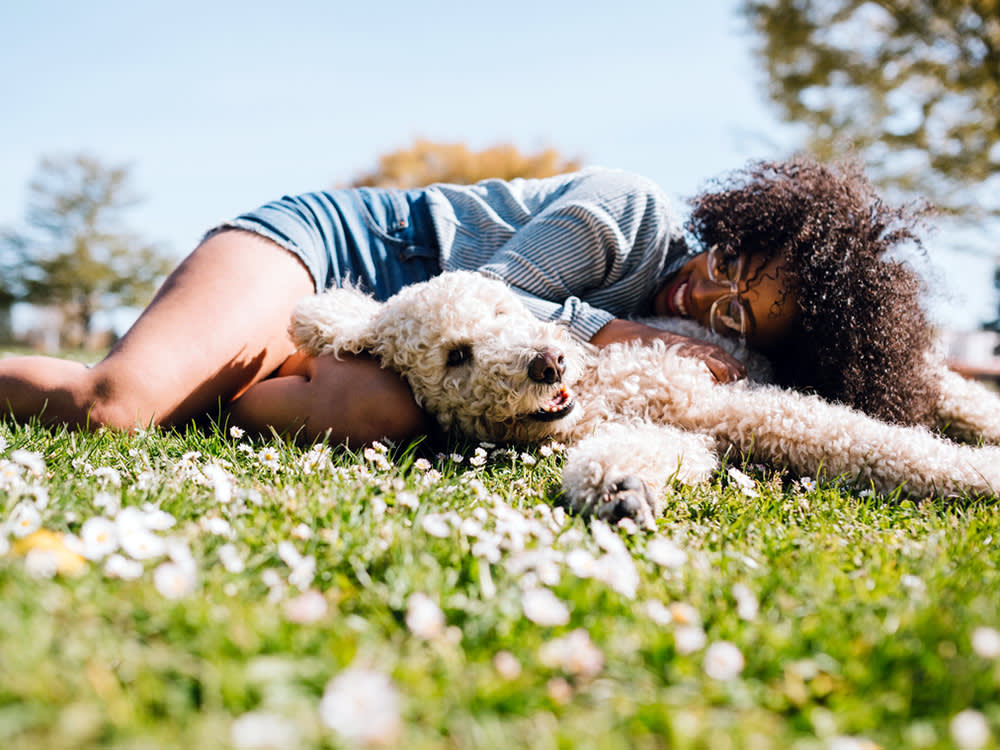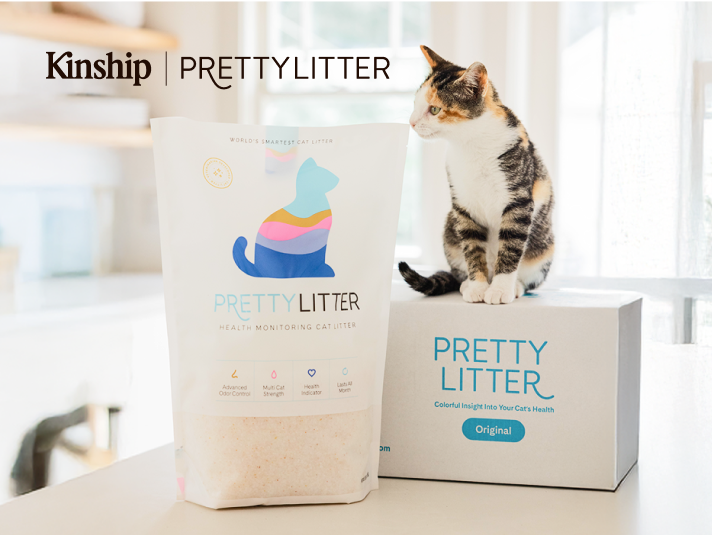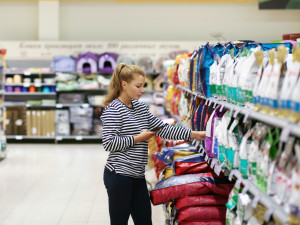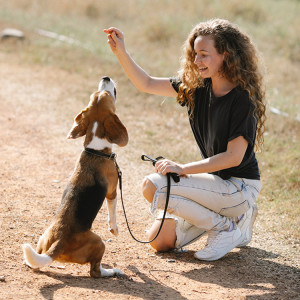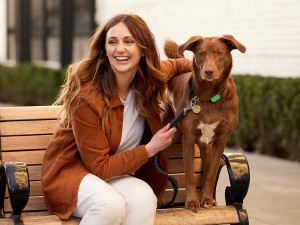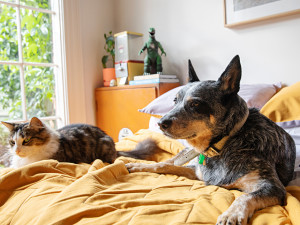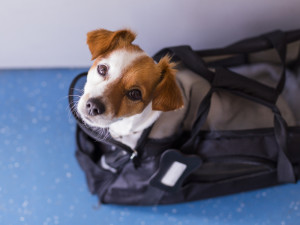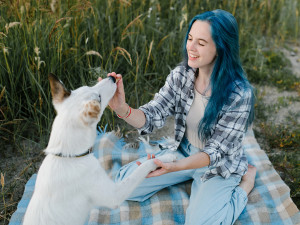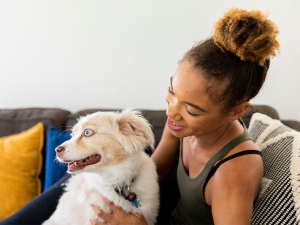Here Are the Biggest Pet Trends For 2024
From sustainability to training, here’s what the new year promises to bring.
Folks, the numbers are in, and it’s official: We are a culture of people obsessed with their pets. In 2023, according to Forbesopens in new tab, 66 percent of our households included an animal — with 85 percent of dog parents and 76 percent of cat parents referring to their furry roommates as family members.
So, it’s no surprise that the U.S. has been shifting toward empowering and enriching pet parenthood. This is good news for us, because we’ve never had so many resources at our disposal. Over the past year, Kinship editors have been watching closely as products and services have shifted meaningfully towards conscious parenting, smart finances, and better quality of lives for both pets and their parents. With that in mind, here are the biggest pet trends — things that will likely factor into your own life! — that are poised to go big in 2024.
Save on the litter with color-changing tech that helps you better care for your cat.
Personalized pet nutrition is the answer.
Humans follow diets to meet their specific health needs, and vets agree that your pets should, too. According to ADMopens in new tab, a global human and animal nutrition company, “Many of the global drivers…identified to power growth in human nutrition are equally relevant to propel growth in pet nutrition, including the themes of balanced wellness, proactive personalization, and seeking sustainability.” In fact, nutrition is the number-one factor pet parents have begun to consider while researching how their dog or cat can live their best lives possible.
For dogs, this includes reading the fine print on food labels to weed out what your dog might not need, factoring in your animal’s breed, considering supplements such as Omega-3s and probioticsopens in new tab, as well as adding superfoods to their diets. For cats, focusing on protein rich meals, Omega-3s, plus “human foods” rich in antioxidants, aminos, and fiber have become pretty compelling game-changers.
Sustainability extends to our pets.
In a recent study from NielsenIQopens in new tab, 78 percent of U.S. consumers said that a sustainable lifestyle is important to them, and this applies to their pets, too. Everything from the supplies you use to clean up after your pet to the food you feed them can contain chemicals that may be destructive to their health and the environment.
Expelling chemicals from your life can be a challenge at first, but there are several effective at-home hacks — many using baking soda and vinegar — that will not only spare the environment, but will save you money, too. For food, you can opt to cook a “clean” healthy meal at home for your pets, which lessens their carbon footprint and is also cost effective, or sub-in the occasional . Just be sure to check with your veterinarian to make sure you’re giving your pet all the nutrients they need.
As for any products we purchase — from toys to food to accessories — the pet space has taken note. You’ll see more B Corp labels, biodegradable packaging, and other important packaging language or logos to make sure products are as eco-friendly as possible.
The preferred pet-training method is fear-free.
Founded by Dr. Marty Becker, Fear-Free Training is a type of training for any animal that limits the use of restraint to lessen the fear and anxiety that is too-frequently part of the pet-training process. In this scenario, the trainer or pet parent uses positive reinforcement to encourage pets toward desired behaviors. Ultimately, it avoids stoking any trauma.
“The worst thing for a pet parent is to feel like you’re hurting your pet by trying to help them. If your pet thinks it will absolutely be harmed or is going to die when it goes to the veterinarian, that’s a red flag,” Dr. Becker . “If the vet insists on putting your pet up on the table every time, that’s a red flag. If they’re handling them roughly or restraining them, that’s a red flag.”
Dr. Becker’s method is derived from more than 300 science-based studies aimed at empathetically yet effectively shaping pet behavior — and it’s caught on. Because in the end, a stress-free animal means a stress-free owner.
Science is our bestie (after our pets, of course).
The preventative healthcare industry is booming thanks to the simple, heartfelt demand to find ways to detect illnesses in our pets before it’s too late. In particular, there are a handful of impressive tech-savvy collars out there, most offering a compelling triangulation of monitoring your pet’s whereabouts, observing their day-to-day health, and alerting you of any concerning events. It’s a godsend to pet parents who are busy, into preventative care, obsessed with their pets, or all of the above.
Our editors are particularly smitten with Whistle’s GPS pet tracker and activity monitor for dogs. The AI-informed monitor was created by an esteemed team of vets and data scientists. They developed the app around the medical records and behaviors of over 100,000 dogs to determine how certain actions relate to health. Meanwhile, PurrSong’s LavieTAGopens in new tab was developed by a cat lover who suddenly lost his feline and wants to spare others that heartbreak. While not AI-powered, it does collect important health and location data to help inform your important decisions.
And if you want to take early detection a step further, there are also home-testing kits such as Oncotect’s cancer-testing kits for canines and Wisdom Panelopens in new tab’s cat DNA test. They’re pricey, but can save you money — and spare your pet from suffering — in the long run.
Pet insurance is a priority.
One of the first reality checks a new pet parent will face is that keeping your dog or cat healthy can get expensive. As pet parents have gotten more savvy about healthcare, pet insurance is no longer merely a consideration, it’s become a must-have.
Kinship previously published a guide to finding the best insurance (and fine print to consider) and what it should cover. Start-ups have been answering calls to find more affordable options, which has yielded such apps as The Kinopens in new tab, which offers 24/7 access to vets. It can give you valuable insight into whatever may ail your pet, before you rush off to an expensive in-office or ER visit.
Between food, grooming, supplies, and healthcare costs, pet parents have likewise been investing in pet-centric finance apps such as DuePetopens in new tab, which consolidates all your pet’s information, while offering reminders (grooming, vet visits, etc), and most importantly, helps you track your spending against your budget.
Travel is better with your pet.
As pet parenthood becomes more entwined in our lives, the demand to find ways to travel with our pets has increased. The United States Department of Transportation reportsopens in new tab that over two million pets travel by air each year. And a poll by Motel 6opens in new tab indicated that 54 percent of pet parents travel with their cats and dogs. Times are changing, and with it, consumer demand.
For a fee — and in some cases health papers for your pet — many airlinesopens in new tab will oblige most small-pet parents for domestic travel. (Kinship strongly discourages opting to put your larger pets in cargo because of safety issues.) Service animals are usually accommodated for free, with proper documentation. But since 2021, it’s become increasingly more difficultopens in new tab to bring an emotional support animal into a plane cabin. (Be sure to contact an airline for details before making any assumptions.) In reaction to all of the above, pet parents who have the budget to do so are opting to book travel on private jetsopens in new tab with specific animal-friendly flightsopens in new tab open to multiple passengers.
Barring the cost and perils of air travel, an increasing number of pet enthusiasts are road-tripping — and not just camping anymore — in reaction to a growing trends of pet-friendly hotels and resorts, as well as Airbnbsopens in new tab. To that end, there is also a growing assortment of dog harnesses, carriers, or seatbelts out there to protect your road-bound dogs and cats.
